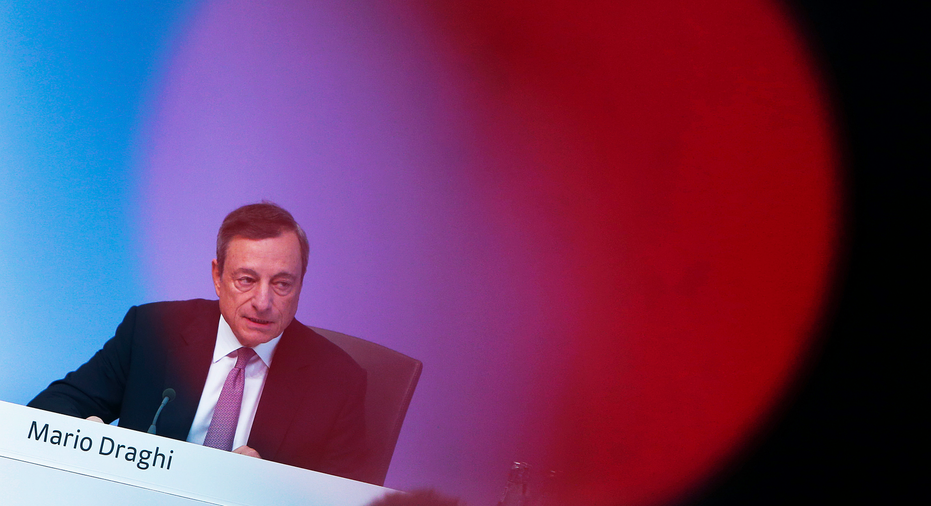European Central Bank in no hurry to yank stimulus

FRANKFURT, Germany – Things are looking up for the European Central Bank. The 19-country eurozone economy is gathering speed. Higher oil prices should boost still-sluggish inflation, the bank's chief concern.
And, so far, financial markets haven't panicked over the bank's Oct. 26 decision to scale back its bond-purchase stimulus program, to 30 billion euros ($35 billion) a month from 60 billion euros starting in January.
So analysts aren't expecting big changes at Thursday's meeting of the bank's 25-member policy council at its skyscraper headquarters in Frankfurt.
Instead, they will scrutinize President Mario Draghi's remarks at the post-decision news conference for more hints about precisely how and when the bank might finally bring the stimulus to an end next year.
Here are the key themes to watch out for.
___
CLOSE ENOUGH?
The ECB will release Thursday its first inflation projection for 2020 — a key indicator of whether the bank thinks it is achieving its mission of keeping annual inflation close to, but less than, 2 percent.
Analysts predict 2020 inflation of 1.8 percent or 1.7 percent, pretty close to the bank's target. Draghi's news conference could give a better sense of whether the central bank would see 1.8 percent as a sign it had carried out its mandate.
Florian Hense at Berenberg Bank says a figure of 1.8 percent "would pave the way for a gradual scaling back of the ECB's stimulus in line with its current guidance," while anything less "would raise the risk of an extension of asset purchases beyond September 2018. This looks unlikely, though."
Oil prices are up 18 percent since the ECB made its last forecasts in September, meaning they will boost inflation predictions.
Currently, the ECB thinks inflation this year will come in at 1.5 percent, still short of the mark.
___
A SUDDEN STOP?
The ECB has said the bond-purchase stimulus program will run at least through September 2018, and longer if needed. The bank left the end date open, giving itself some flexibility in case of unexpected economic trouble. Remarks by some ECB board members recently suggested no further purchases after September, and investors will listen closely for further hints from Draghi. In any case, a decision is only expected next year.
The purchases pump newly printed money into the financial system, which drives down long-term interest rates and makes it easier for companies, governments and consumers to borrow. In theory, the step should help growth and raise inflation.
___
EUROBOOM
The eurozone economy grew 2.6 percent in the third quarter from the year-earlier quarter and unemployment is at 8.8 percent, down from over 12 percent at its peak in 2013. Draghi often takes the opportunity to single out the ECB's stimulus measures as a major reason that millions of new jobs are being created. That's also his opening to underline that, since the current upswing is being supported by the bank's extraordinary monetary measures, those measures will be withdrawn slowly. That message is aimed at avoiding sudden market shifts such as a spike in market interest rates or a sharp appreciation of the euro's exchange rate, which could hurt eurozone exports.
___
STEADY AS SHE GOES
The bank's basic policies will remain in place Thursday. Those include a record low of zero for the main refinancing rate, the rate at which the ECB lends to commercial banks, plus a minus 0.4 percent rate on deposits the ECB takes from commercial banks. The negative rate is a penalty aimed at pushing banks to lend the money rather than let it sit at the ECB. Beyond that, the bank is expected to keep language in its post-meeting statement that rates will stay unchanged "well past" the end of the bond purchases. That promise lets markets rest easy in the knowledge that any rate increases are far off. If the bond purchases are halted at or near the end of 2018, that would push any rate rises well into 2019.
___
RED SKY AT MORNING
The ECB's recent statements have not all been cheery. In particular, the bank warned that many eurozone banks are still burdened by bad loans and low profitability. It also suggested that global financial markets may see a sudden drop after hefty gains. So far, markets have not been spooked by the planned withdrawal of stimulus measures by the ECB and the U.S. Federal Reserve. Stock markets in Germany, the biggest eurozone economy, and in the United States have hit record highs this year.



















